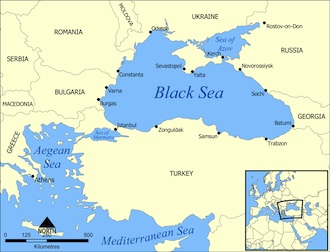After over two years of buildup in the Baltic Sea area of Eastern Europe, NATO is running out of places plausibly near Russia to justify putting more troops in. They see the Black Sea, however, as a next big target for buildup, with the first US troops arriving earlier this week in Bulgaria and Romania.
 The Obama Administration started the NATO buildup in 2014 in the Baltics, talking up the idea of a Russian invasion of Eastern Europe, and even though the invasion never happened, Obama and his successor, President Trump have dutifully continued the buildup with no signs of slowing down.
The Obama Administration started the NATO buildup in 2014 in the Baltics, talking up the idea of a Russian invasion of Eastern Europe, and even though the invasion never happened, Obama and his successor, President Trump have dutifully continued the buildup with no signs of slowing down.
The big problem with putting US troops in places like Bulgaria and Romania though, is despite the Pentagon hype about this being all about Russia, those nations aren’t particularly close to Russia, and not even having proximity to the exclave of Kaliningrad, that northern European nations cling to as proof of a Russian threat.
This has NATO officials hyping up the idea of a big naval buildup in the Black Sea, which would challenge Russia’s Black Sea fleet. This has the advantage of Russia actually having a Black Sea fleet, albeit not a huge one, though the idea also has serious problems.
Chief among those is the Montreaux Convention of 1936, which strictly regulates the number of warships allowed into the Black Sea from nations that don’t have Black Sea coastal territory. NATO’s three Black Sea states are Bulgaria, Romania, and Turkey.
Which is the point at which, rhetoric aside, the NATO talk of buildup collapses. Bulgaria already publicly rejected the idea of such a NATO fleet, saying they have no intention of joining it. Turkey’s close cooperation with Russia in Syria is likely going to preclude them wanting to invest in a bunch of new warships to challenge Russia, and Romania’s Navy is itself extremely limited.
The result is likely to be some for-show deployments by other NATO members with real navies for wargames around the area, but with the Montreaux Convention limiting those deployments to 21 days, they aren’t going to amount to a practical permanent force.


